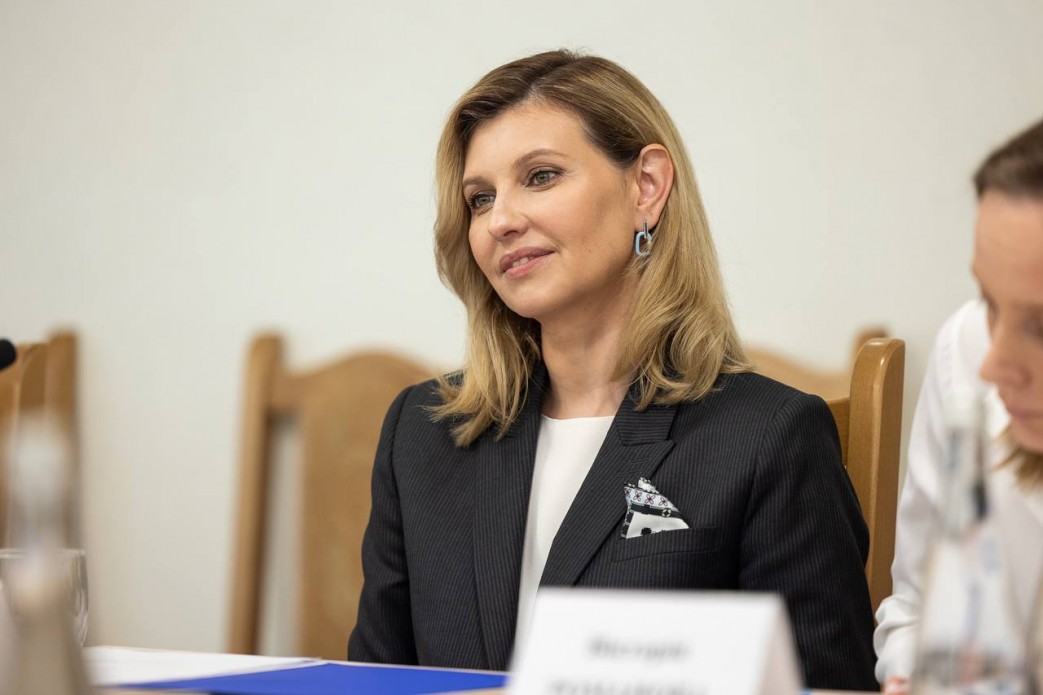First Lady of Ukraine Olena Zelenska summarized the results of her work in 2023 on reforming school nutrition.
"This global all-Ukrainian reform is about children and for children, for their health today and for the health of Ukrainians in the future. We started it even before the invasion, aiming to form healthy eating habits in an entire generation. But during the full-scale war, it became more important as it became a form of protection for our children, taking care of their present, overshadowed by Russian aggression. We have to create the best conditions for them to have the energy to study, plan their future and realize their plans," the President's wife said.
Olena Zelenska spoke about the main emphases and directions of the reform this year.

1. Amendments to the legislative framework
For the school nutrition reform to take place, it is necessary to have an appropriate legislative framework. Work on aligning it with the present-day needs began in 2020. But 2023 was a landmark year in this regard: three new technological models of catering in educational institutions were developed. These are the base kitchen (when food is cooked directly in schools and kindergartens), the hub kitchen (when the institution cooks not only for its students, but also for children from other institutions), and the kitchen factory. The latter is an innovative solution for Ukraine, as nothing of this kind has been implemented in Ukraine before.
These developments were approved at the legislative level by the resolution "On Amendments to the Procedure for Organizing Catering in Educational Institutions and Children's Health and Recreation Facilities," which the government adopted on June 1, 2023.
The document also stipulated the possibility of using catering to provide meals for children in kindergartens.
2. Adoption of the School Nutrition Reform Strategy for 2023-2027 and the Action Plan for 2024
On October 27, 2023, the Cabinet of Ministers of Ukraine approved the Strategy for Reforming the School Nutrition System for 2023-2027.
The strategy defines an action plan for 2023-2024, priority areas of work until 2027, and operational tasks. In particular, it refers to four strategic goals of the reform:
- Sufficient financial resources for customers to purchase food products or catering services and making sure that procurement is done simply and efficiently.
- Restoration and modernization of catering facilities in educational institutions using the latest technological processes, improving energy efficiency and adhering to the principles of the HACCP system.
- Providing local governments and educational institutions with sufficient staff of qualified employees who organize catering in a quality and safe manner and promote healthy eating habits among students.
- Conscious choice of healthy food by Ukrainians.

The strategic goal of implementing the above four points is to ensure diverse, balanced and high-quality meals in educational institutions, contributing to the social protection of vulnerable groups and developing healthy eating habits among children and adults.
Indicators of achieving the strategic goal:
- reducing the percentage of obesity among children under 18;
- the level of satisfaction of students with meals in educational institutions;
- changing food preferences of school-age children;
- increasing the number of students eating in educational institutions;
- the number of comprehensively modernized or renovated catering facilities.
The implementation of the School Nutrition Reform Strategy should become the basis for building a healthy society and significantly reducing the level of non-communicable diseases in Ukraine.
"I know from many of the projects I supervise how difficult it is to modernize anything - in this case, school nutrition - while fighting for survival. But we have no other time for this. We live in the here and now, and even more so do our children. This is their only childhood. This is not a formal issue, but a matter of survival for all of us. It is possible to both hold the line and develop," the First Lady is convinced.
3. Ukraine confirmed its intention to join the School Meals Coalition
On October 18-19, the first global summit of the School Meals Coalition took place. The Ukrainian delegation presented the successes of the school nutrition reform to participants from over 90 countries. At the same time, negotiations were held on the sidelines of the summit with representatives of international organizations and governments of other countries that are implementing national school nutrition reforms.
Following this trip, the school nutrition reform team, which is working to implement the changes, has set a goal to organize and hold the next Coalition summit in Ukraine. We have a lot to show our international partners and friends in the field of providing healthy food to children in schools and kindergartens: we have developments and experience that can be useful to other countries.

4. Provision of meals to primary school pupils (grades 1-4) and children from privileged categories
This area has become one of the priorities, as it is about taking care of the youngest children and those who need special support and protection. Unfortunately, the number of children in privileged categories is increasing: these are internally displaced persons and children of the military. Therefore, in 2023, the reform community and local communities made great efforts to find resources so that these children could have meals in educational institutions free of charge. Thanks to the support of partners and donors, certain success was achieved.
In February 2023, a Memorandum of Understanding and Cooperation on the implementation of the school meals program was signed between the Ministry of Education and Science and the World Food Programme (WFP) in Ukraine.
During the 2023-2024 school year, WFP will finance 30% of daily hot meals for children in grades 1-4 in schools in Kyiv, Lviv, Zakarpattia, Ternopil, Khmelnytskyi, Chernihiv, Chernivtsi, Cherkasy, Mykolaiv, Odesa and Poltava regions – more than 60,000 children in 420 schools across the country.
5. Implementation of the cascade method of disseminating successful experience of reform implementation
In 2023, the Kyiv Regional Military Administration, together with the reform team, organized and held three partnership meetings "Nutrition Reform: Challenges, Achievements, Prospects" for colleagues from other regions. The events were attended by the heads and other representatives of 22 regional state administrations.
The purpose of the series of meetings was to actively exchange experience and establish cooperation between regions, to attract support for regional initiatives from relevant ministries and government agencies, which should help communities improve the nutrition of children in educational institutions as quickly and efficiently as possible. After all, local authorities and local self-government bodies will be responsible for the implementation of the reform on the ground in 2024.

6. Holding regional fora
In 2023, the School Nutrition Reform Project Office team organized and held 11 fora dedicated to the implementation of the school nutrition reform strategy in the regions. The events took place in Odesa, Poltava, Ternopil, Khmelnytskyi, Kyiv, Vinnytsia, Dnipropetrovsk, Chernivtsi, Ivano-Frankivsk, Zakarpattia, and Lviv regions.
During the fora, the participants, including representatives of the RMAs, local governments, territorial communities, and educators, had the opportunity to learn about the practical aspects of the reform, assess its effectiveness on the ground, and share the first results.
An important part of the fora was the discussion of the School Nutrition Reform Strategy for 2023-2027. It is on its basis that communities and regions will be able to develop their local strategies for implementing changes to the nutrition system in educational institutions in 2024. They should envisage updating the catering facilities in educational institutions, choosing a model of catering, training for cooks, etc.
"It is in the communities that the reform is being implemented. They are the ambassadors of change on the ground. Ukrainian communities have already shown how they can overcome difficulties related to the war. Now it's time to show how they can build their own future. Reform is not only about food, it is about joint action. It's about interaction within the community, initiative, and concern. The reform is not only about new responsibilities, but also about new opportunities for communities: jobs and economic revitalization that the regions need," the President's wife said.

7. Development of culinary hubs
There are currently four culinary hubs in Ukraine - in Kyiv, Poltava, Odesa, and Ternopil regions. They have trained more than 120 coaches - "agents of change" - who are now passing on their knowledge to school canteen cooks and colleagues in the regions.
Active work has begun to create a number of culinary hubs in other regions: Khmelnytskyi, Chernivtsi, Ivano-Frankivsk, Rivne, Kharkiv, Dnipropetrovsk and Odesa regions. In the near future, cooks from towns and villages in these regions will be able to undergo training and advanced training in their regions, as is currently the case in Kyiv region, where more than 1,000 cooks have been trained.
8. Completion of the first kitchen factory in Ukraine
At the initiative of First Lady Olena Zelenska and with the support of the Howard Buffett Foundation, a kitchen factory was built in Kyiv region to feed about 10 thousand children in the region. A similar kitchen factory will be built in Kharkiv region. It will prepare food for 13 thousand children.
"We have big plans. We hope that this kitchen will be the first of a network of such enterprises. The second kitchen factory in Ukraine will be built in Lozova, Kharkiv region. It will feed about 13,000 schoolchildren and preschoolers in five communities of Lozova district every day. The school nutrition reform is ongoing - we are choosing the best option for each region: some will have a kitchen factory, like here, others already have hub kitchens - this is a different model, where one school, where the equipment has already been updated, cooks for many others. This is the case, for example, in Lviv region. I always emphasize that we are building not just kitchens or catering facilities, but equal access to healthy food for every child in every corner of the country: from big cities to the smallest hamlets. We want to raise a healthy generation and we will do it. No matter what," the First Lady summarized.

9. Modernization and restoration of catering facilities
To achieve the goal of the school nutrition reform, it is very important that the canteens and kitchens of educational institutions meet modern standards. Therefore, in cooperation with the Ministry for Communities, Territories and Infrastructure Development of Ukraine, the reform team made sure that those educational institutions that were damaged as a result of the hostilities and are currently being restored take this into account and ensure that their catering facilities meet the requirements of the reform.
However, it is an extremely difficult task for Ukraine to accomplish this on its own. That is why our country is grateful to its partners and friends who are helping us along the way.
For example, joint work with the Embassy of Switzerland has begun to repair and restore the catering facilities at a school in Chernihiv.
"This is an important step and support for us. We feel that we are not alone in the fight for the future of our children. But this is also an important step for the whole world. Because caring for childhood and education should be the responsibility not of one country, but of all. After all, childhood has no borders, just as human development does not," Olena Zelenska said.




